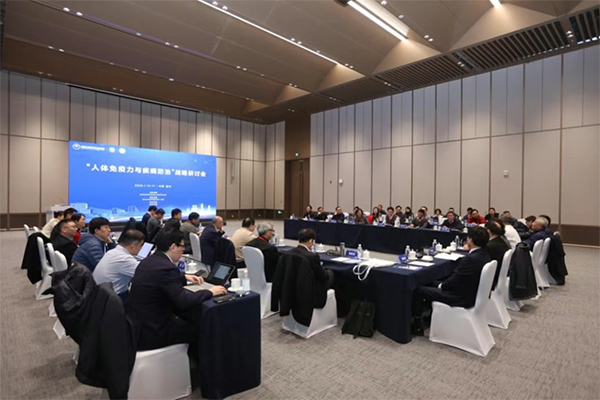

On January 16-17, 2025, the "Human Immunity and Disease Prevention and
Control" strategic seminar of the Medical Science Department of the National
Natural Science Foundation of China was held in Chongqing. This conference is
hosted by the Medical Science Department of the National Natural Science
Foundation of China, organized by the First Affiliated Hospital of Zhejiang
University School of Medicine, and co organized by Chongqing Jinfeng Laboratory.
Academician Tian Zhigang of the University of Science and Technology of China,
Academician Wang Fusheng of the General Hospital of the Chinese People's
Liberation Army, Academician Wu Yuzhang of the Army Medical University of the
Chinese People's Liberation Army, and Professor Liang Tingbo of Zhejiang
University co chaired the meeting. Academician Zhang Xuemin, member of the Party
Group and Deputy Director of the National Natural Science Foundation of China,
and Gao Ruiping, Secretary General of the Advisory Committee of the National
Natural Science Foundation of China, attended the meeting and delivered
speeches. Hong Wei, Deputy Director of the Department of Medical Sciences,
presided over the opening ceremony.
Vice Director Zhang Xuemin pointed out in his speech that immunology is the
fastest developing and most dynamic discipline, especially the discovery of PD-1
immune checkpoint, which has shown us hope for humanity to overcome tumors.
However, even so, our understanding of immunity is still very limited. In
addition to malignant tumors, organ fibrosis, lupus erythematosus and various
autoimmune diseases, as well as infectious diseases such as hepatitis B, are all
related to immunity. On the other hand, studying the immune system from an
isolated perspective due to its inherent complexity and individual differences
may bring many limitations and biases. Therefore, regarding the vast diversity
of T and B lymphocytes in the immune system as a complex system with collective
intelligence, and conducting comprehensive research through immune decoding, is
becoming a new trend and paradigm in the field of immunology.
Secretary General Gao Ruiping stated in his speech that the topic proposal
put forward by the National Natural Science Foundation of China should be based
on the positioning of the national key research and development plan and the
responsibilities and missions of the National Natural Science Foundation of
China in the new era, reflecting strategic, fundamental, and forward-looking
aspects, and should pay attention to the differences from the layout of existing
national science and technology major projects.
Academician Tian Zhigang emphasized the importance of the human immune
evaluation system, immune manipulation strategies, and new immunotherapy plans
in his speech, and expressed his expectation that the attending experts will
summarize key scientific issues in this field through conference discussions,
and provide high-quality services for the national key research and development
plan topic proposal.
This conference focused on four topics, including "Decoding Human
Immunity", "Immunity and Diseases", "New Strategies for Immunotherapy", and "New
Technologies and Methods for Immune Research". Four conference reports and 30
special reports were presented. Experts at the meeting suggested that a
quantitative characterization method for immunity should be developed based on a
large-scale population queue related to diseases, and a multidimensional
immunity database should be constructed; Applying technologies such as big data
and artificial intelligence to decode immune function, analyze dynamic evolution
patterns and their underlying mechanisms; Thoroughly investigate the core role
of immune changes in the occurrence, development, and prognosis of diseases;
Conduct research on multidimensional intervention strategies and methods
targeting immunity, improve disease prevention and treatment by manipulating
human immunity, and enhance people's health level.
Bian Xiuwu, academician of the Army Medical University of the People's
Liberation Army, Zhan Qimin, academician of Peking University, and more than 40
experts from universities and research institutes across the country, as well as
staff from relevant departments of the Natural Science Foundation of China,
attended the meeting.